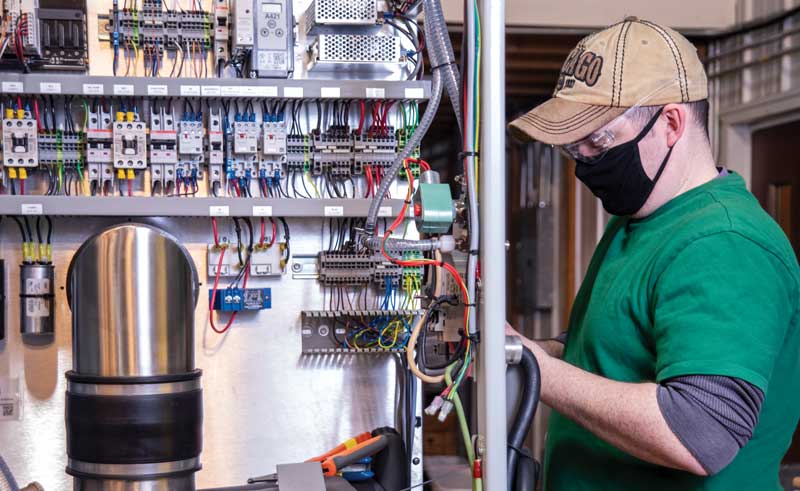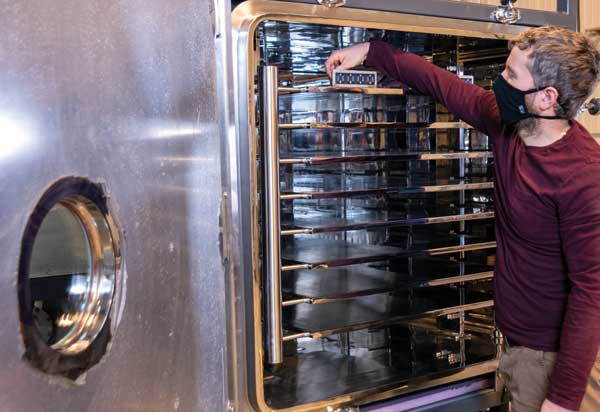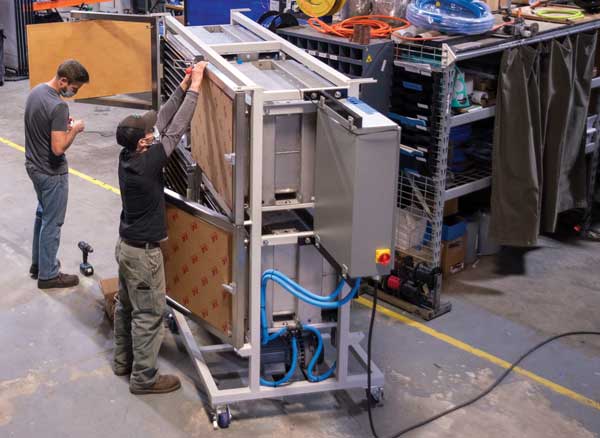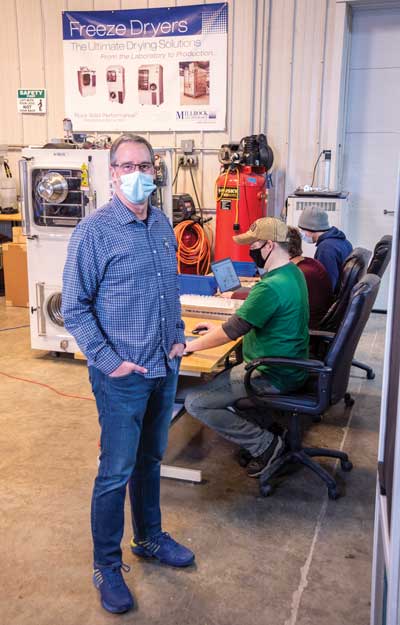MILLROCK TECHNOLOGY
by Taylor Dowd
THE FUTURE IS FREEZE DRYING:
How Millrock Tech is Revolutionizing the Industry

Millrock Technology, Inc. (Millrock Tech) designs and manufactures freeze drying equipment for the pharmaceutical industry. Freeze drying is a liquid removal process that can be used to preserve the shelf life of certain materials, many of which are essential ingredients in life saving products. By extending the shelf life of these key products, they become easier to store and ship, more stable, and less expensive to administer.
The Kingston-based company began operations in 2005 and is among the world’s freeze-drying technology leaders today. In response to the COVID-19 crisis, Millrock Tech has ramped up production to help supply key equipment for diagnostic kits and vaccine production helping to win the battle against SARS-CoV-2.
“Our machines are built with a knowledge and expertise that enables our customers to produce the best products for their customers.”
What Freeze Drying Is and How Millrock Tech Does It
Freeze drying became mainstream in the early 20th century for its uses in penicillin and polio vaccine production, and as serum for blood plasma used in the world wars. Many products, such as vaccines, required water to be removed for stabilization before being shipped across the country. To reconstitute the vaccine, water would be added back into freeze dried material and be ready for use. In the case of serums, the blood would be centrifuged to remove the red blood cells. The remains, called plasma, could be freeze dried, shipped to war zones and reconstituted. Those injured could be infused to raise blood pressure after sustaining blood loss and other injuries. As technology progressed, the pharmaceutical industries took reign over these processes.
Millrock Tech prides itself on being a cutting-edge innovator in the pharmaceutical freeze drying industry, making machines for over 800 clients at its 24,000 sq. ft. facility. The company provides solutions to customers and specializes in equipment that are pharmaceutical grade, meeting the highest standards. Millrock Tech primarily services the pharmaceutical, biotech, and active ingredient companies. “We make custom freeze dryers for sophisticated applications and we tailor equipment to satisfy specific needs. Our machines are computer controlled and built to the highest pharmaceutical standards,” Millrock Tech President and CEO T.N. Thompson says. “Our machines are built with a knowledge and expertise that enables our customers to produce the best products for their customers.” Some of those products that clients have freeze dried include bone and tissue, cements for broken bones and teeth, injectables for eyes, reagents for test kits, ingredients for pharmaceutical manufacturing, collagen for wound care, and veterinary vaccines, among many others.

Responding to COVID-19
Currently, equipment for companies that produce diagnostic kits is a major portion of Millrock Tech’s business. These kits are used to detect illnesses like HIV, flu, and COVID-19. As the pandemic worsened, a major increase in demand for the kits meant a corresponding demand for equipment and an immediate spike in orders. Thompson says this big opportunity came to them because of their strong reputation in the industry, built up over time by focusing on quality and customers. “If we didn’t already have the business, there was no way someone would come to us to respond to COVID testing demands. We have a good relationship with a lot of companies, and we’ve become their go-to vendor. These new opportunities are significant,” he says.
Roadblocks to Vaccine Distribution
The traditional FDA regulatory process for approving new pharmaceuticals is generally lengthy and difficult. In the case of vaccines, for example, there are steps from formulation development to clinical trials that typically take years to complete. For COVID, the process has been fast-tracked.
One of the biggest challenges in distributing the COVID-19 vaccine is its shelf life. Made out of the protein mRNA (messenger RNA) the vaccines need to be kept in a frozen state to keep from degrading. Once thawed, the vaccines only have a couple hours before they expire. If they are not injected within this time frame, they must be discarded. “It’s a huge problem in the distribution system for COVID vaccines,” says Thompson. Vaccines are biologics, meaning they are made from living organisms and their products. Biologics can be stabilized using freeze drying, to eliminate the need for cold storage. Once freeze dried, they can easily be shipped across the globe and reconstituted to their original state without sacrificing their efficacy.
The development time for producing a freeze dried version of the vaccine for the first round would have delayed release. In the future, however, the COVID vaccine manufacturers are pursuing freeze drying. The benefits of freeze drying are greatly rewarding. The current COVID vaccines must be stored in ultra-low temperature freezers. Freeze drying would allow them to be shipped and stored at room temperature without any need for refrigeration. Once ready for use, saline solution would be added to the vile. The vaccine would reconstitute to its original state and become injectable. In the longer-term, freeze drying could shift the process for major manufacturers and make distribution more accessible and efficient.
Once a freeze dried version of the vaccines is approved, there will be additional hurdles to production. Vaccines are made in large batches and would require large freeze dryers. Constructing new production freeze dryers could take 14 to 18 months. Once the equipment is installed, it must undergo a validation process. It could take two to four years between ordering the equipment and making it usable to produce vaccines. Therefore, it is more likely that current production freeze drying capacity will be used. The result could be shortages in other freeze dried pharmaceuticals.
The COVID pandemic has brought a major supply-chain issue to the forefront: many of the ingredients required to produce a vaccine are manufactured abroad, primarily in India and China. To be able to respond better to public health crises, the U.S. will need to focus on improving domestic capabilities to produce the necessary materials for self-sufficiency.

Climbing the Ladder
Thompson’s father and grandfather both owned their own freeze drying manufacturing companies, making Millrock Tech the only third-generation freeze drying company in the world. Thompson has been surrounded by business his entire life. Originally from New Paltz, he attended University of Colorado at Boulder to pursue engineering. He explains the competitiveness of the program and the unlikelihood of completing it. “They sat us down the first day we got to school. They put all of the freshmen into the auditorium and said, ‘Look to your left. Look to your right. One of you will be here at the end of the four year period.’ I was the one. I wasn’t a great student. I played tennis and skied and struggled through college. It took me five years, but I finished.”
Upon graduating, Thompson returned home to New York (“Nobody else would hire me!” He joked) and began to learn the trade at his father’s business, FTS Systems. Before computers were widely accessible, Thompson faced the grueling task of logging data from the machines minute by minute. “My father was phenomenal about teaching. I had to do everything that nobody else wanted to do to learn the business,” he said. He would join his dad in the office to learn the production side of the business. Sitting in on phone calls with customers, sales people, patent attorneys, and lawyers taught him the work that went into sales, marketing, and sustaining the company. “It was like an MBA on steroids,” says Thompson.
Above all, Millrock Tech seeks to do work that can positively impact lives.
After his father sold his company, Thompson was determined to create another company and focused on improving the equipment and process technology knowing it would be beneficial. The timing was right, with the projection that the aging population in the U.S. would drastically increase and healthcare would become more prominent. Thompson decided to start his own freeze drying company.
With a loan from his father, a computer, a small office space, a self-developed website, and a single college intern for his staff, he started Millrock Technology. On January 1, 2005, he launched the company’s website, right on the cusp of Internet commerce becoming more widespread. His family’s freeze drying pedigree gave his company an edge in terms of credibility, and gradually, the company grew. Mastering freeze drying has allowed the company to create new product features and significant improvements in the freeze drying process. He continues his family’s legacy of successful freeze drying business owners. In the time since starting his company, he has built his own path while upholding the values and effort put forth by his predecessors.
Millrock works closely with the engineering departments at premier educational institutions like Purdue University, University of Connecticut, Politecnico di Torino, and SUNY New Paltz to push the boundaries of technology. Millrock Tech’s multiple patented technologies and several more pending patents are just one way the company is paving the way to innovation in manufacturing and redefining the future of freeze drying.

Company Culture
Millrock Tech emphasizes an attitude-over-skills approach for its employees. “We like to hire self-starters who are confident in what they do, able to communicate, and have a positive attitude. I’ll take a person with a positive attitude over a person with skills any day of the week. When we talk to people it’s not just what you know, it’s how you interact.” Thompson recognizes a difference in technical skills that are taught in higher education versus those taught internally. The lack of skills in younger applicants makes filling positions difficult. “The hardest thing to get is new employees who know how to use tools and that can systematically troubleshoot problems,” he says. Schools do not teach many of the basics used regularly at Millrock Tech. He has become a firm believer in the hands-on approach. He recounts an employee’s success story with learning internally. When an employee who had previously been an auto mechanic, then a service technician, became interested in going back to school, Millrock Tech offered him the opportunity to learn skills in another department and learn the trade first-hand instead. “One year into it and he’s one of our best programmers,” Thompson says.
The manufacturing sector has a need for skilled employees willing to work on a team and learn on the job. Thompson acknowledges the changes in manufacturing and making innovation in the field more understandable and appealing. “Many people think manufacturing is a Ford Model T coming off an assembly line. That’s not what manufacturing is today, and people don’t want to work in manufacturing if that’s what it is. We have to change the perception of what it is.”
With over 100 years of freeze drying experience across three generations, Thompson has seen firsthand the importance of creating strong relationships with customers and a positive work space for employees. “Our philosophy is customer first. If you can keep your customers happy, they’re going to come back in the future,” he says. He speaks on his appreciation for smaller companies and the relationships he has formed with his team. “Nobody here works for me. I work for them. I call it a big family. When this whole COVID thing hit we talked through it and figured out what to do. Now, our management team meets every Monday to review each other’s priorities. Everybody knows what the objective is. That’s what I love about small companies. That’s our culture.”
Above all, Millrock Tech seeks to do work that can positively impact lives. Thompson recognizes how far his company has come and the ability his business has to make a difference. “Luck is where preparedness meets opportunity and we’re very lucky right now. Business is a series of challenges that you need to respond to and it changes everyday,” he says. “My entire focus was to provide a solution to a problem that had a positive effect on humanity. Our freeze drying technology and products ultimately end up saving lives.”

Taylor Dowd is Communications Coordinator at the Council of Industry. She is a journalism graduate of SUNY New Paltz.


